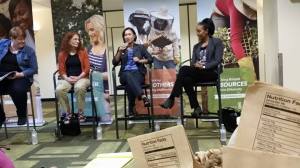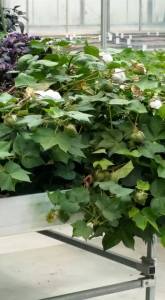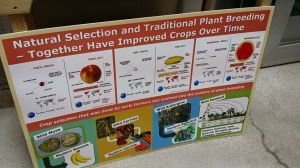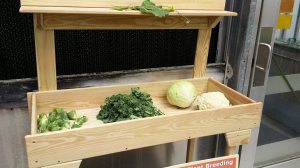On April 25th, I was fortunate enough to tour Monsanto’s research center in St. Louis,Missouri, with a group of Mom’s dedicated to learning about food and farming. We boarded a plane early in the morning, and hit the ground running. I was a nervous wreck…not just because I hate to fly, but also because I felt intimidated, and I felt overwhelmed at the prospect of the million different questions that were bouncing around my head. I was worried that even if we asked the truth, we wouldn’t get it, it would be smoke and mirrors in an attempt to appease our concerns.
I am happy to report…..I was WRONG. Much to my surprise, they were MORE than transparent, and they answered our questions with incredible knowledge of fact, incredible displays of science, and incredible rebuttal to fiction. I left,feeling more overwhelmed than ever, but now, it was because nearly every argument I had set out to have, had been laid to rest. And really, who likes admitting that they’re wrong?? Certainly, not ME.
So, where do I start ? How do I begin trying to educate my readers on a topic as hot and explosive as biotechnology ?? How do I break it down to its basics, in hopes that you will keep reading ? Willing to put your opinions aside ? As many have expressed, quite loudly, when I signed up for this tour, I had sold my soul to the devil. I assure, I have done no such thing. I went with an open mind, and I listened, and I talked, and I learned. I sat before four incredibly intelligent women, also Mothers, give me the facts on GMO technology. I set aside my pre conceived notions and embraced the science behind the madness. I went in with a willingness to get both sides of the story. And guess what I heard ? I heard the things no one talks about on the internet, the things that no one reads (even though they ARE out there….check out http://www.GMOANSWERS.com ) I learned answers to questions I was afraid to ask, I learned that ever so valuable lesson, that NOT everything you read on the internet is true. Who knew ?
Our Q & A panel
SO…let’s get down to brass tacks….shall we ?
What exactly ARE GMO’s ?? Those in the field, prefer the term biotechnology, but tomato, tomAHto…..In essence, GMO’s in plant agriculture in the most basic of terms, means intentionally taking a gene for a trait you want or need from one plant and inserting it into another. Are you asking yourself BUT WHY ? I did…..and the answer was both complex and simple at its core. It all boils down to what’s best for the farmer : Farmer’s select GMO’s to aid in things such as pest control (this means LESS pesticide is sprayed topically, which means less drift, less use, less impact), GMO’s help to protect from extreme drought, disease and they also allow a farmer to plant more food on less usable soil. Remember, only 1/4 of the Earth has available land and 1/2 of THAT is unusable. So more for less, goes a long way. GM crops also help a farmer with soil conservation by allowing to take a no – till approach, this is important because it takes over 100 years to create 1 inch of topsoil. It simply cannot afford to be lost.
There are only eight crops that are available from GMO seed : Field corn, Canola, Soybean, Alfalfa, Cotton, Sugar beets, Sweet corn, Summer squash and Rainbow papaya. My favorite little factoid ?? Without biotechnology, the papaya would be EXTINCT…no more…gone forever….and I don’t know about you, but man….I would MISS IT. Eating a ripe papaya is like taking a mini tropical vacation with each bite.
GM cotton
You see, genetically modified crops have been around long before a scientist ever thought of gene insertion. 10,000 years ago, yes 10,000….humans began crop domestication using selective breeding, Every fruit, vegetable and grain that is commercially available has been altered by human hands. EVEN ORGANIC. How about that ??
And in the 1700’s farmers and scientists began cross-breeding plants within a species Without crop domestication, Brussels sprouts, Romanesco cabbage, Broccoli, Kale and Bok Choy would not be available for our dinner plates, as these all are genetic relatives of wild cabbage !! It has always been done. It’s just that now, it’s done more precisely.
I truly could go on and on, but at the risk of boring you to tears, I won’t. I promise.
I asked many of you, what questions do you want answered ? And the question that came up most was….ARE THEY SAFE ??
The simple answer….Y E S.
The more complex one: Biotech crops are the same as their non – GM buddies !! Nutritionally as well as broken down to its most basic structures. GMO foods have been in the marketplace for 17 years. They have been found, through repeated testing to be NO different from their NON GM counterparts. GM crops are subjected to more testing than any other new crop variety, therefore, we know more about them than any other crops that have been developed over the past few CENTURIES. GM crops are assessed by two, and sometimes three Federal agencies: the FDA, USDA and EPA. They don’t reach your grocery cart until they have been deemed safe and nutritious.
So, what does biotechnology hold for the future ?
It has been demonstrated that this technology can increase the amount and stability of pro-vitamin A, iron and zinc and improve the digestibility of sorghum. What is so important about that ? It is anticipated to benefit Africans who rely upon sorghum, which is normally deficient in key nutrients.
Another example ? Golden Rice.
Golden Rice is another biotech crop which is nutritionally improved. The amount of beta carotene has been increased and could provide half the daily required provide HALF the required pro-vitamin A for a 1 to 3-year-old child. That can save lives.
But the most important example ?? Biotechnology can help us meet the growing demand for food, despite the influences of drought, poor soil, and B U G S. More full bellies.
To me, helping to produce more food, and improve the crops that those in developing countries rely upon, well, that has the power to change the World.
That is worth its weight in science !!
I encourage each of you to read , to research, to ask honest questions and open your mind to honest answers. The future truly is now.
Check it out !!!
http://www://www.findourcommonground.com
*** lunch and travel within St. Louis, provided by MONSANTO ***




So glad you were able to be with us in St. Louis and I totally understand the overwhelmed feeling you must have had. Like you, I have worked hard to get to a point of openness you talk about coming here with for other topics discussed in a heated way. I really appreciate the effort you have taken!
Plese know we understand that this is an ongoing conversation so if you have more questions, we are glad to help. A lot of that is done through discover.monsanto.com/conversation — we appreciate the need for much greater transparency than we had in the past.
So awesome that you’ve learned what GMOs really are. Are you taking others with you to any farm tours? That’s always a great way to educate folks.
Thank you for being opened minded and willing to listen and learn. Wish so many others would take the same approach. Fearmongering has scared them so far to the other side I am not sure there is any coming back.
that is exactly the point I am trying to make. I WAS one of those who believed what I read, but didn’t always bother to learn the other side of the story. Education and knowledge are power – and I have MANY friends who disagree with me at this point, BUT ….I asked them to trust me, and research some of the science instead of the hype
This story warms my heart. Sometimes it feels like people are so afraid of biotechnology and the myths that surround it that there is no chance for anyone to listen. Thank you for opening your mind and learning. The only problem I have with your write up is that people are talking about these things on the Internet, it just seems like our voices are often silenced. I have been banned and deleted from many pages and forums for simply asking questions. I am always respectful. I am a Mom too and I care about the health of my family just as much as anyone. It saddens me that we can’t have a conversation even if we don’t agree – we can always learn from each other! Check out the blog pages of some of the people commenting here, we often talk about the truths behind the myths that circulate social media.
thank you !! I will do just that. All I asked of my readers was for them to PLEASE have an open mind and attempt to educate themselves to the other side. The hype often does out voice the science !!
I applaud your courage and intellectual integrity.
thank you !
I want to commend you on being open minded and going directly to (what many consider) the “lion’s den” to learn. It’s so unfortunate that Monsanto has such a bad reputation, most people can’t even articulate why, they are one of 6 biotech companies and farmers have so many choices to make—Monsanto certainly isn’t the only one. I’m a farm wife, mom of two little boys and I blog about agriculture as it’s a huge part of our life. Thank you so much for this blog post, I shared it on my Facebook page and it’s a huge hit!
Thank you so much !!
I too try to stay open minded as I never want to be a foe to change just because it’s change. There are two misconceptions that I can’t ignore; plant hydrids and plant cross breeding programs are something that could occur in nature, we are just speeding it up with eduction at our back. Genetic modification/gene insertion could not and would not occur in nature. A plant would never cross with a pesticide; period. Brussel sprouts are two species within a genus crossed but the parents are both plants from the plant kingdom. While soybeans are fine, inserted with genes to resist dying when sprayed with glyphosate are not genetic material from a genus of plants. It’s unfair that they would circumvent this fact because you all were not botanists.
Also, noting a reduction in pesticide use is not relevant when you realize that other genetic modification is preformed to allow a significant increase in herbicide use-these two pts just negate one another.
Oh, and papayas would not be extinct without genetic modification, unless you are irresponsibly including hybridization and cross breeding programs into the genetic modification category…
Alright, 3 pts. Again, I do applaud you for being open minded but their presentation certainly wasn’t complete. Hopefully this is received as helpful information in your GMO digging.
With this issue it is very important to stay open minded. Misconceptions run thick on this topic because it is a complicated one. I would just like to touch on a couple points you made. One is that GMOs could never occur in the wild. Genetic modification is just a way of speeding up traditional methods as you said (which most people agree are safe). Without it papayas may not be extinct but the papaya industry would be. Farmers need this technology in a speedy fashion to save their crops. Without GMO technology we are at risk of loosing our orange industry to citrus greening and chocolate is even in danger. Here is a write up talking about how it is believed that the sweet potato is actually a GMO that occurred in the wild
http://www.npr.org/sections/goatsandsoda/2015/05/05/404198552/natural-gmo-sweet-potato-genetically-modified-8-000-years-ago
Regarding your pesticide/insecticide comment, BT is actually ‘naturally occurring’ and it is not a simple matter of crossing a plant with a pesticide. BT is used in conventional and organic farming. GMO BT corn and cotton have, without a doubt, reduced the amount of pesticide applied. Insecticides have dropped in monumental amounts since the introduction of GMO crops. There are conflicting reports on the amounts of herbicide. Some say GMO tech has reduced amounts some say it is a wash but regardless it has dramatically reduced the amount of more harmful pesticides used. Consider that glyphosate is less toxic than caffeine. On our farm we are able to use glyphosate now instead of much more harmful chemicals previously used. Regardless people need to understand that pesticides and GMOs are 2 separate things. A farmer can overspray roundup and not seed a GMO in his life, and many farmers seed GMOs and because of it successfully reduce their pesticide load. Banning GMOs will not stop pesticide use. Please look at #8 on this list for an alternate explanation
http://www.popsci.com/article/science/core-truths-10-common-gmo-claims-debunked.
I would expect that an afternoon tour wouldn’t be a ‘complete’ presentation of everything involving GMOs. But if we have questions shouldn’t we go to the source to ask? Sometimes we need to take a deeper look at what we consider a misconception. If you can provide peer reviewed studies to support your claims I will consider looking at my viewpoints as well. But sometimes we need to be careful where our evidence comes from.
It is so encouraging to read the experience of someone who was open minded enough to actually search out the truths regarding GMO use. Kudos to you, my friend, for being one of those people! It is discouraging to continue to try to educate people about this, when it seems so many refuse to even consider the thought they might be wrong. Thank you for reminding me there are people out there who put forth the effort to educate themselves instead of blindly accepting what seems to be the truth.